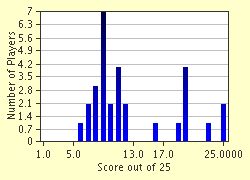Quiz Answer Key and Fun Facts
1. A: 'Ahimsa' is a Hindu concept of which of these?
2. B: Baisakhi is a Sikh festival celebrating what?
3. C: What is the significance of 'Chi' or 'qi' in Taoism?
4. D: 'Du'a' in Islam are which of these?
5. E: Which of these describes 'Elohim' in Judaism?
6. F: 'Fatwa' in Islam is which of these?
7. G: 'Granthi' is a Sikh who reads the Scripture at the service.
8. H: 'Haoma' in Zoroastrianism is what?
9. I: In Eastern Orthodox Christianity, what is an 'Icon'?
10. J: 'Jen' is a concept of righteousness and harmony in which religion?
11. K: 'Koan' in Zen Buddhism is which of these?
12. L: 'Langar' a part of every Sikh temple, is a room for what activity?
13. M: 'Mahayana' is a branch of Buddhism. What does this word mean?
14. N: 'Namaste' is a Hindu greeting. What is its meaning?
15. O: 'Olam Ha'ba' is a Jewish belief in what?
16. P: What are 'Parsees'?
17. Q: 'Quran', the Muslim holy book, is believed to have been written by the Prophet Muhammad himself.
18. R: 'Ridvan' is a 19-day festival of what religion?
19. S: What are 'Shastras'?
20. T: 'Tirthankara' is a name given to great teachers of Jainism. What is its literal meaning?
21. U/V: The 'Upanishads' are Hindu scriptures which include the 'Vedas'.
22. W: What is 'Wudu'?
23. X: 'Xian' (sometimes also transliterated as ren or jen) is a Confucian term that describes what?
24. Y: 'Yokigurashi' (joyous and blissful life) is a concept from what religion?
25. Z: In Islam, what is 'Zakah'?
Source: Author
funky_nickie
This quiz was reviewed by FunTrivia editor
looney_tunes before going online.
Any errors found in FunTrivia content are routinely corrected through our feedback system.

